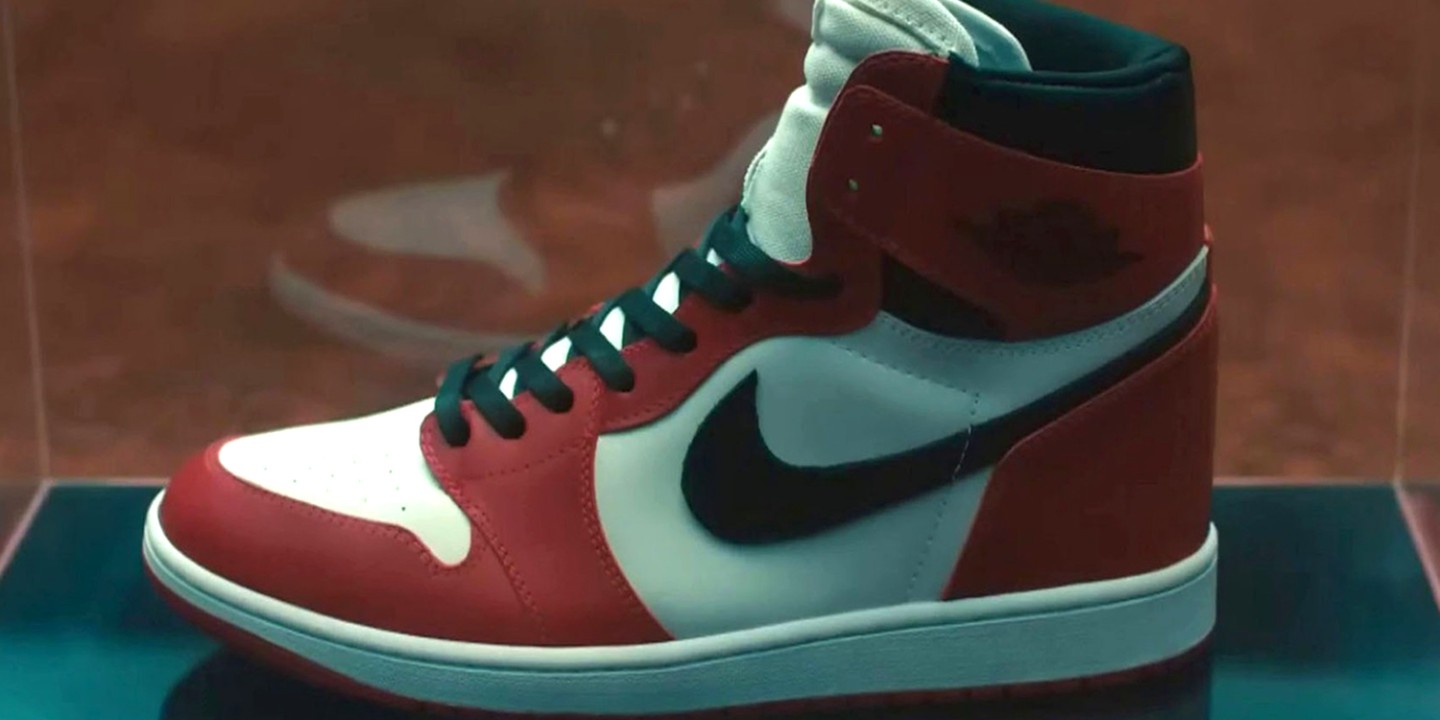Welcome to the commodity biopic
These movies about influential consumer objects aren’t really origin stories at all.

Air image courtesy Amazon studios
“A shoe is just a shoe until my son steps into it,” Deloris Jordan (Viola Davis) says in a pivotal scene in Air (directed by Ben Affleck). She is repeating back to Sonny Vaccaro (Matt Damon) a line he used in a rousing corporate pitch to convince Deloris’s son Michael (yes, that Michael Jordan) to sign a shoe deal with Nike. Deloris and Sonny are the only two believers in Michael’s superstar potential. We’re supposed to see that they want what’s best for him, while everyone else is just another corporate stooge trying to profit off a Black man’s excellence.
Except, of course, that Sonny is also a corporate middleman trying to save the struggling basketball wing of what was then predominately a running shoe company, and Deloris is using Sonny’s own line as bait to lure him into an unprecedented deal that would give her son royalty rights on every pair of shoes sold.
Read our latest issue or browse back issues.
Welcome to the sleight of hand of the commodity biopic: movies about the origin stories of influential objects that shape our contemporary consumer landscape. Air was released within months of similar movies about the invention of the video game Tetris (Tetris, directed by Jon Baird); the smartphone that paved the way for the iPhone that then replaced it almost overnight (BlackBerry, directed by Matt Johnson); and the Flamin’ Hot Cheeto (Flamin’ Hot, directed by Eva Longoria).
Each movie turns what would be a boring story about corporate strategy into high stakes drama. Sonny warns Deloris to watch out for various tricks of his rival companies, laying out ahead of time what she can expect at each meeting. Like a scene from a heist movie where each part of the plan clicks into place, Sonny’s predictions come true, and Deloris takes note of his insight. The nerdy inventors of BlackBerry have solved the technical problem of putting a computer into a phone without crashing cell service, but it doesn’t matter until they find a business partner who knows how to make their brilliance shine in a boardroom. In Tetris, British, American, and Japanese businessmen duke it out, sometimes literally, over the rights to license the new game, invented by a Soviet computer engineer in his spare time. KGB agents infiltrate and intimidate, deals are double-crossed, borders are almost closed—all so that an American-Dutch citizen who lives in Japan can secure the rights to Tetris for Nintendo’s new handheld device, the Game Boy.
Flamin’ Hot makes this overinflated drama part of its humor. Richard Montañez (Jesse Garcia), a high school dropout and ex-gang member, rockets from janitor at a Frito Lays factory in southern California to vice president of multicultural marketing when he invents the Flamin’ Hot product line. He admits, however, that he is prone to exaggeration. He narrates the scene of how he wowed a room full of stuffy executives, only to back up and concede the reality was more fumbling and less triumphant. As Richard talks, the movie plays out both versions of the story so we can laugh along at his grandiose self-invention—and be moved by his humble self-deprecation. This was probably a calculated decision on the part of the filmmakers, since extensive reporting by the LA Times proved persuasively that, while Montañez did make a meteoric rise from janitor to VP, he was not involved with inventing anything flamin’ hot.
My entire family loved Flamin’ Hot, and even after my 13-year-old whipped out his omnipresent iPhone and read us all the deceptions we had just been fed, our indignation quickly fizzled out, like the aftertaste of a spicy Cheeto. The suspense and drama of the commodity biopic work without the need for either accuracy or mystery. The first sight of Steve Jobs pitching the first iPhone tells you how BlackBerry ends. Even though my best friend got a Game Boy in 1990 with Tetris in the box, I was on the edge of my seat to see how the deal would close.
Part of the pleasure of these movies is looking back on the not-so-distant past as a foreign country: a world before video games turned computer terminals from productivity machines for elite workers into entertainment devices for all of us, before sneakers defined a careful hierarchy of street style, before corporations discovered the magic phrase “multicultural marketing,” before the smartphone. Only because we live in a world so utterly transformed by these consumer objects can we marvel that it was ever otherwise. How foolish those shoe executives look now, betting against Michael Jordan! How provincial the idea of a smartphone with an external keyboard! All the contingencies of our present melt away like the ending to a plot we knew ahead of time, making it impossible to ask if this is the story we want to be living in.
Karl Marx once described commodities as fetishes, because we can no longer see the conditions that make them possible. While our market economy defines commodities as raw materials and other fungible goods, Marx maintained that any object made by human labor that satisfied a human need—physical or psychic—was a commodity. In our current world order, commodities in Marx’s sense seem to appear out of nowhere, and so we invest them with an abstract, almost magical quality. Karl Marx never ate a Flamin’ Hot Cheeto, but he would recognize the shimmering dust of a rags-to-riches tale that clings to Richard’s story like the spicy slurry that coats his snack foods or the power of desire that transfers a superstar athlete’s aura into every pair of shoes that bears his name. These movies don’t really want to explain that magical transformation as much as participate in the magic themselves.
Which means these aren’t really origin stories after all. The actual conditions that bring these consumer products into being—the ecological devastation wrought by the cobalt mining needed for a phone’s microchip, the working conditions at factories that assemble those phones or stitch those sneakers—are beside the point. If we understood those origins the shoe would be just a shoe, one none of us could afford to live with.







